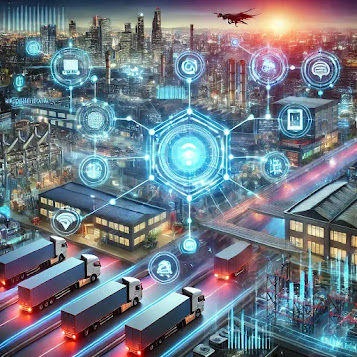From Aviation to Fashion: Supply Chains Navigate Crises and Innovation
Zomato Hyperpure Expands Warehousing Capacity
Zomato Hyperpure has leased a 253,000 sq ft warehouse at Lodha Industrial and Logistics Park in Palava, Mumbai. The five-year lease, commencing on February 15, includes a monthly rental of ₹85.3 lakh. This expansion aims to enhance Zomato Hyperpure's supply chain operations, ensuring efficient distribution of quality ingredients to restaurants in the region.
Source: Economic Times
India's Civil Aviation Faces Net Loss Due to Supply Chain Issues
India's civil aviation industry is projected to incur a net loss of ₹2,000 to ₹3,000 crore in the current and next fiscal years. This is attributed to ongoing supply chain disruptions and engine failures, despite increased air passenger traffic and improved pricing power. These challenges continue to impact the industry's capacity and yields.
Source: Economic Times
Leadership Changes at Walmart:
Walmart has appointed Dave Guggina, formerly Executive Vice President of Supply Chain, as the U.S. Chief E-commerce Officer. Guggina succeeds Tom Ward, who will transition to Chief Operating Officer at Sam's Club. Guggina has been instrumental in automating Walmart's supply chain, aligning with the company's strategy to enhance its e-commerce operations. Notably, Walmart reported a 22% increase in third-quarter U.S. e-commerce sales, driven by a growing consumer trend towards online grocery shopping.
Source: Reuters
Corporate Strategies Amid Trade Tensions:
In response to escalating trade tensions, particularly involving the U.S., global companies are prioritizing the resilience and transparency of their supply chains. A survey by The Conference Board indicates that 85% of executives from 1,700 large companies plan significant changes, focusing on adopting artificial intelligence and diversifying vendors. The National Retail Federation reported a surge in container port traffic as importers expedited shipments ahead of potential tariffs. Policymakers and researchers are examining supply chain risks, noting that enhancing resilience might lead to increased prices.
Fashion Industry Supply Chain Outlook:
The fashion and luxury goods sector faces uncertainties due to unresolved tariff issues, geopolitical tensions, climate change, and evolving sustainability regulations. The introduction of digital product passports in Europe increases scrutiny on transparency and labor practices. Brands are focusing on reducing costs, improving delivery times, and adapting to reduced demand through advanced forecasting and optimization. Strategies such as nearshoring, multi-sourcing, and strategic partnerships are recommended to mitigate geopolitical risks and shipping costs. India and Vietnam are emerging as significant hubs, with investments in local ecosystems, workforce training, and infrastructure advised to fully harness these regions' potential. The use of AI technology is expected to drive efficiency and improve supply chain visibility.
Concerns Over Forced Labor in Solar Supply Chains:
The U.S. administration facilitated nearly $2 billion in incentives to South Korean solar company Hanwha Qcells to expand its manufacturing plant in Georgia. However, concerns have arisen regarding the company's supply chain, which includes materials sourced from Chinese suppliers allegedly using forced labor from Uyghur Muslims in Xinjiang. Despite efforts to expand U.S. manufacturing, the reliance on foreign, ethically questionable suppliers has drawn criticism. Advocates argue for reshoring production to avoid ethical risks and strengthen the U.S. economy.
Conflict Minerals in Technology Supply Chains:
The extraction and trade of coltan, a mineral essential for consumer products like smartphones and electric vehicles, are fueling violent conflict in the Democratic Republic of Congo (DRC). The militia group M23 controls significant coltan production, employing smuggling routes to funnel the ore into Rwanda, where it's sold as "conflict-free" to global smelters, primarily in China. Despite U.S. legislative measures like the Dodd-Frank Act intended to prevent conflict minerals' influx into American supply chains, the illicit trade persists, exacerbating humanitarian crises in the region.
Source: WSJ
Logistics and Infrastructure:
Asia faces logistical challenges like congestion and environmental concerns, but countries such as Singapore are investing in green shipping technologies and blockchain to improve efficiency and transparency
Source: Bloomberg
Export Taxes in Russia:
Russia has implemented export taxes on wheat to stabilize domestic prices and ensure food security. For instance, in October 2024, the export duty on wheat was increased by nearly 41%, rising from 2,517 rubles (approximately $25.78) per tonne to 2,569.2 rubles (approximately $26.33) per tonne. This adjustment aims to control the volume of wheat exports and manage domestic supply levels.
Source: Global Trade Alert
FedEx Plans Freight Spinoff
FedEx has announced plans to spin off its trucking unit, FedEx Freight, raising questions about timing, leadership, and the impact on the less-than-truckload (LTL) market. The move aims to streamline operations and focus on core competencies.
Source: Supply Chain Dive




Comments
Post a Comment